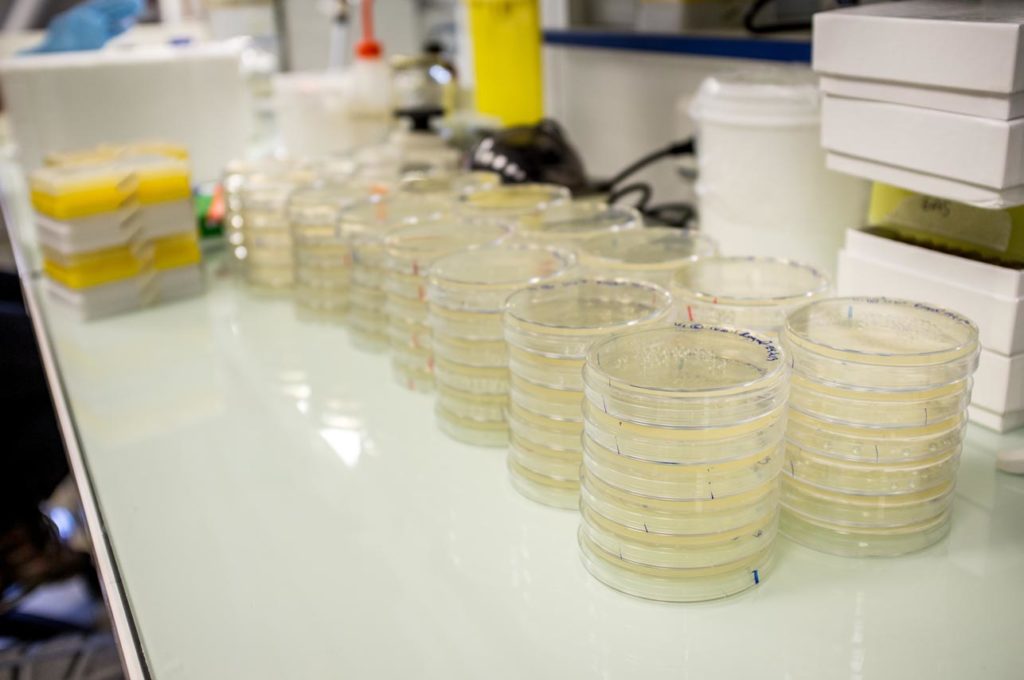
Scientists at the Gulbenkian Institute of Science explore social interactions between bacteria to manipulate pathogens.
A new study, published in the scientific journal Current Biology, proposes new strategies to induce the collapse of bacterial populations.
A research team led by Karina Xavier, from the Gulbenkian Science Institute (IGC, Portugal), identified new ways to promote “cheating” in bacterial communities, and consequently their collapse, simply by manipulating the chemical composition of the environment.
Similar to human societies, bacteria live in communities. In order to better adapt to the environment, bacteria interact with each other. They regularly produce compounds that are excreted into the surrounding environment and consumed by the entire population. These compounds function as public goods as they benefit the entire bacterial community.
However, some bacteria have mutations that prevent them from producing these public goods. These bacterial mutants act as “cheaters”, benefiting from public goods without contributing to their production.
“Like human societies, bacterial populations also have cheats. Some citizens do not work and enjoy the tax benefits provided by taxpayers without having to pay taxes. If too many citizens follow this trend, the entire economic system collapses. The same is true with bacteria. Cheating bacteria profit from products produced by other bacteria without contributing to that production”, explains Özhan Özkaya, first author of this study and a doctoral student in Karina Xavier's laboratory at the time this research was conducted.
“Cheating allows them to save energy, so these bacteria can grow faster and faster. Ultimately, cheaters can invade the population, leading to the extinction of the population as public goods will no longer be sufficient for everyone”, adds the IGC researcher.
It was known that bacterial populations can collapse in the presence of cheaters for one task at a time. But in nature, in an infected organism, populations of bacteria can include several mutants with deficiencies in producing different tasks.
So what happens if other cheaters play the same game? To investigate these social interactions, the IGC team used Pseudomonas aeruginosa, an opportunistic pathogenic bacterium that infects lungs and is commonly found in patients with cystic fibrosis.
Chronic infections caused by these bacteria often contain several bacterial mutants. Karina Xavier's team used test tubes and Petri dishes to grow normal bacteria and two strains of bacteria with mutations that resulted in failures to produce two different public goods.
The researchers noted that interactions between these two mutants and normal bacteria could prevent population collapse.
“Our results show that when cheaters cheat each other, the population collapse that could be caused by one cheater can be avoided and the population is able to remain stable for longer. This may be very good from a bacteria point of view, but it is bad news when you want to eliminate an infection caused by an unwanted pathogen,” says Özhan Özkaya.
To be able to predict how to change the fate of bacterial populations when different cheaters are at stake, the researchers created a simple mathematical model.
The predictions of this model were then tested once more in test tubes and Petri dishes. Özhan and other members of the Xavier team showed that by altering the nutrients given to bacteria, they could change the cost of these cooperative actions and drive the stable population to extinction.
“In recent years, we have made tremendous progress in understanding how bacteria interact with each other. This new approach has allowed us to develop predictions about how bacterial communities might gain from cooperation or suffer from cheating. In my opinion, new drugs that act to block the social behaviors of bacterial communities will be much more effective in fighting infections than the antibiotics now available. This is because they will induce the collapse of bacterial populations with lower risks associated with the development of resistance, unlike what happens with traditional antibiotics”, says Karina Xavier.
The economy at the service of microbiology
Contrary to what one might initially think, economic theories can contribute to understanding the behavior of communities of organisms other than humans.
Countless researchers have been using concepts from economics to study the social interactions of bacteria. Two of these concepts are the “tragedy of the commons” and the “public dilemma theorem”.
According to economics-based theories, these concepts stipulate that human societies can suffer individual choices that neglect the well-being of the community in pursuit of personal gain, that is, when they benefit from a public good.
This is what is observed in bacterial communities that include bacterial mutants that are deficient for the production of compounds used by the entire community.
This new study by the IGC team exemplifies how that understanding can be used to establish strategies for manipulating bacterial pathogens.
Author: Ana Mena (Gulbenkian Institute of Science)
Science in the Regional Press – Ciência Viva


















Comments